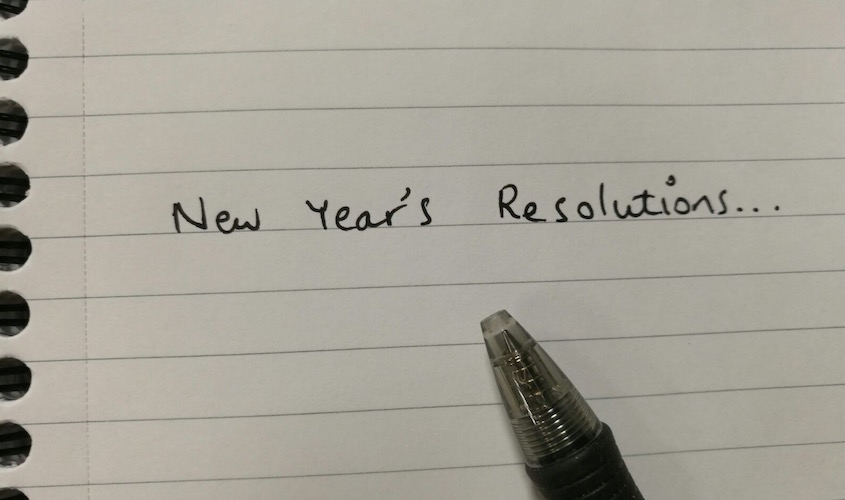Five New Year's resolutions to build peace
You know how it is: you do a job interview, or you want to impress someone. You blow it, and then, afterwards, in the bath or walking the dog, you think of all the witty, insightful things you meant to say – and didn’t.

That happened to me when Sarah Brown, founder of TheirWorld, the charity campaigning for children globally to get an education, asked me about the skills you need to get into peacebuilding, in an interview for her podcast series, ‘Better Angels’.
I burbled on incoherently and afterwards, cycling back to the office, the answers came flooding into my slow brain. So here are my answers, which I thought I would share as the five steps that we can all take to help build a more peaceful world in 2018.
What I did manage to say to Sarah is that everyone can get involved in peacebuilding. You don’t need a PhD or years of specialist training. You are not going to be creeping through the jungle to find armed groups and come out flourishing a signed peace deal. But you can be part of the peace forged in any community – from Northern Ireland to Colombia – that hinges on ordinary people reaching out across divides and finding ways to live and work together. To contribute to that flourishing of civil society, you need to bring people together. So here are five steps that we can all take to build peace:
1- Walk in someone else’s shoes: As the advocate of active non-violence, Mahatma Gandhi said: “Three quarters of the miseries and misunderstandings in the world would finish if people were to put on the shoes of their adversaries and understood their points of view”. To be a peacebuilder, you need to try to understand the point of view of others, even people who seem to have moved beyond understanding. It’s a skill that artists and actors use to great effect. I recently saw Liwaa Yazji’s play ‘Goats’ at the Royal Court in London. It shows the young men fighting for Assad as scared teenagers sucked into a vortex of violence which, and that’s the play’s key message, all too soon becomes normal behaviour.
2- Listen loudly: You have to listen to what people are saying, and I mean really listen, not the nodding along while waiting to speak that most of us do most of the time. You have to be ready to listen to people with whom you disagree. As our patron at International Alert, Archbishop Desmond Tutu said: “If you want peace, you don’t talk to your friends. You talk to your enemies.” You have to create a space where people can talk with open hearts and open minds, and know that they will be heard, whatever they say. You have to listen as loudly as the voices of hatred and division that are shouting. Then you can win the trust of those who have been excluded. As a peacebuilder, you need to gently peel back societal labels to find the real men and women underneath.
3- Be ruthlessly optimistic: Peacebuilding is not for the faint-hearted. Too often, it is one step forward and ten steps back. At International Alert, our colleague in the Philippines chaired a ceasefire committee that was seeking to end the long-running conflict between the Philippines Government and the National Democratic Front of the Philippines (NDF). It is a constant roller-coaster: people did stop fighting and progress was made on the key issues to be tackled, and then it has all unravelled again. So to be a peacebuilder, you have truly to believe that peace can be found; that in the end, all conflicts end. When I was growing up, apartheid South Africa and the war in Northern Ireland seemed absolutely beyond hope of change in our lifetimes – and yet change did come. And that’s the optimism you need to keep on pushing for peace. But this is not happy-clappy optimism. This is about being as tough and hard-nosed as the best of the cynics.
4- Be patient for peace but impatient for change: That’s a tricky one. Peacebuillders have to be ready for the long-haul; you cannot be in a hurry. Winning people’s trust takes time, and helping people rebuild minds shattered by bombs and bullets takes years. Nepal is a good case in point: while not sufficient, the country has made steady progress towards peace. The civil war waged by Maoists and the state in 1996–2006 caused over 14,000 deaths, and thousands more were injured or displaced. The 2006 Comprehensive Peace Accord (CPA) brought an end to the civil war, which has not since been reignited. The rebel army was successfully disbanded and power-sharing governments ruled until the promulgation of a new constitution in 2015 and a general election in 2017. So peace works, and we can all lobby our politicians and civil servants to keep investing in peace for as long as it need to take root. But while we must be ready to go at the pace of the slowest, we need always to remain impatient for change.
5- Grab the microphone: In recent years, the voices of division have been riding high and those of us who believe in compassion and peace have gone all too quiet. So in 2018, let’s come out; let’s be loud and proud about our values and beliefs, our successes and our failures and let’s galvanise a new mood for peace and shape a new narrative, getting out there and arguing our case more strongly.
So these are my resolutions for 2018. I know that it won’t change the world but I do hope that I can better play my tiny part in opening more space for everyday peace.





